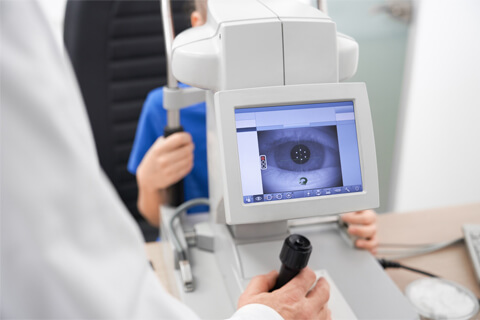Diabetes has a propensity to increase the diameter of RBCs by 10-15%. Bloated RBCs along with higher glucose content in blood increases the density of blood, hence increasing blood viscosity. Higher viscosity affects all the blood vessels present in our body and starves the organs for oxygen. Bloated cells and increased glucose results in reduced oxygen content in blood! There is an extensive network of blood vessels in our retina too. The damage is slow in larger blood vessels but finer blood vessels that are present across the body deteriorate rapidly. Eyes primarily contain fine blood vessels and so they are the first to get damaged. Let’s know how our eyes get affected:
Types of diseases caused by unmanaged diabetes!
There are a host of eye diseases associated with long term unmanaged diabetes. Though, most of these diseases can start slow and reduce vision but long term mismanagement can result in blindness too.
Diabetic Retinopathy: Retina is the inner lining of eyes that helps to see things around us. It captures the light signals and helps our brain decode these images. Retina has many blood vessels that feed it oxygen and nutrients. When these fine blood vessels get damaged by diabetes, the retina also starts malfunctioning. Diabetic Retinopathy creeps slowly which means it can be treated before it gets worse. Not all floaters are benign; some are indications of serious underlying diseases. If your floaters are accompanied by dark spots, blurred vision, fluctuating vision, dark or empty areas in your vision, or vision loss then you should contact your doctor ASAP!
Diabetic Macular Edema: Macula is the area of retina that we use for focusing on things which means that it is used for almost everything like reading, recognising faces and differentiating colours too. Over the time Macula degrades as we get older, this is called Age-Related Macular Degeneration. Diabetes speeds up this process and hence it’s named Diabetic Macular Degeneration.
Glaucoma: Diabetes can lead to Glaucoma in two ways. The first is the instance of neurovascular Glaucoma where abnormal blood vessels grow in your eyes to replace the damaged vessels that were damaged by high glucose initially. This may start as body’s natural response to preserve its organs but these irregular blood vessels block other important systems of eyes. Eye is an intricate organ and it has drainage system to drain the excess fluid. Irregular blood vessels blocking this drainage system can lead to increased IOP and hence Glaucoma if not treated in time. Regular visit to doctor is recommended to elders or people with higher comorbidity factors.
Cataracts: Researchers have noticed a link in between cataract and diabetes. It has been observed that cataract progressively increases in people who have high diabetes. Managed diabetes can slow down the cataract formation.
Diabetes not only affects eye health, it also damages other organs of the body. Like eyes, Kidneys too have fine blood vessels and nephrons that get damaged because of high diabetes. Managing diabetes and being in regular health check-up is the optimal step that people can take. Check-up should not be limited to eyes; it should be of the whole body. At TRC we recommend people to go through comprehensive eye check-up.


